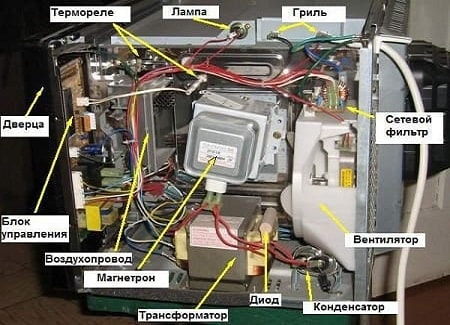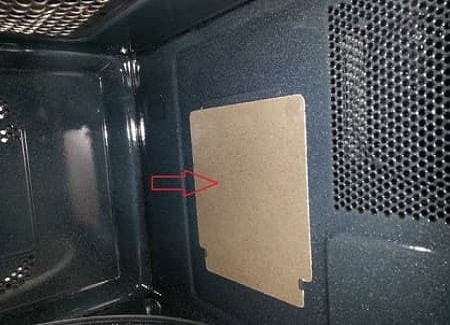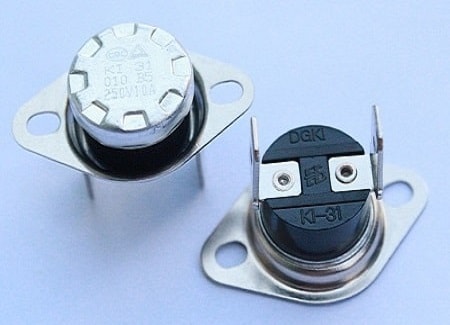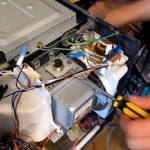To repair a microwave oven, you need to have a general idea of how it works. Microwave oven repair begins with removing the top cover. Before that, you should take care of completely disconnecting the device from the power supply, only then start fixing breakdowns with your own hands.
When these steps are successfully completed, a transformer with two fuses will open for access: one is located directly on the part itself, it is fusible, the second is located nearby on the very body of the microwave oven, made of ceramics. Also next to the transformer is a doubler block consisting of a thick capacitor and a diode. The whole set of these elements is the power supply circuit of the microwave oven magnetron.
Important:
Caution! Do not touch the condenser immediately after removing the top cover. This element is capable of holding voltage for a long time, which can easily lead to an electric shock. When repairing a microwave oven with your own hands, this factor should be taken into account.
Microwave oven
The peculiarity of microwave ovens is that all parts are connected in series. First, you should pay attention to the above magnetron and its power supply circuit. After removing the protective housing, a transformer with a large capacitor located next to it becomes accessible. There will also be a ceramic, low-melting fuse, a diode. The magnetron operates according to this high voltage circuit. Under no circumstances should you climb into it with your hands, tools. After a complete de-energization, the capacitor will lose its residual voltage, the likelihood of an electric shock will decrease.
Circuit principle:
- The primary winding of the micro-transformer takes over 220V. As a rule, its location is at the bottom. You can recognize it by the turns of copper wire, which will be bare in appearance. However, it is not. It is covered with a transparent insulating film. The location of this coil is under the secondary winding.
- The microwave oven has two secondary windings. On one of them, several turns of a simple wire are usually not neatly wound. This heats up the cathode. Here the AC voltage is only 6.2V so that the electrons can be lifted off the surface. But where there is good insulation there is a high voltage winding. About two kV directed towards the exit.
- A diode-shorted capacitor is located at the output of the circuit. The action of the negative half-wave falls on the cathode, the action of the positive half-wave charges the capacitance. Further, the electrode is subjected to double voltage, which is removed from the capacitor and micro-transformer. As a result, approximately 3.5-4 kV is created. This power is enough to start the generation process.

Important:
You should be extremely careful, the output winding is always parallel to the magnetron, which has two output options. But the grounding of the anode is done in a separate way.
Thus, this is what happens:
- the heating coil has 6.3V;
- at the cathode stays up to 4.2 kV, grounded by the anode.
All microwave ovens have an electrical connection for the cathode, heating coil. Each microwave oven is equipped with a timer that controls the magnetron power. The use of a start relay is used in order to avoid the occurrence of a spark. Next, you should pay attention to the front panel.
Advice:
Replacing the mica plate
The most likely breakages occur in the area of the mica plate. Energy is supplied along the rod from the magnetron to the waveguide. The latter is highly sensitive to the presence of various food residues. All these contaminants begin to ignite, emit sparks, thereby disrupting the stable operation of microwave ovens. To avoid unforeseen situations, the developers decided to close the waveguide with a mica plate. It has soft, flexible properties, relatively affordable pricing. It will not be difficult to fix such a breakdown with your own hands. You can buy material of any size, cut the corresponding segment. The peculiarity of the mica plate is that it transmits a frequency level of 2.45 GHz without obstacles. It is at this frequency that the microwave oven operates.

Also, mica plates do not get wet. This is a very important factor if liquids are heated inside microwave ovens. After all, water very quickly absorbs the radiating frequency of 2.45 GHz, there is a danger of serious damage. If the water reaches the waveguide, a big accident is created, which will not be easy to repair with your own hands. The high-voltage fuse blows instantly. If everything gets worse, the magnetron itself burns out, other electronics that power the microwave oven.
What factors influence the destruction of the mica plate? Most reheated food contains a lot of fats, oils, and other such ingredients. They differ in that instead of the usual boil, they shoot out greasy drops. As soon as such a drop hits the mica plate, a small wire bridge is created. An electric arc is formed: from the waveguide to the mica plate, then from it to the body of the microwave oven. As soon as there are pops and sparks uncharacteristic for the operation of stoves, this is a sure sign that the stove will soon require repairs.
Advice:
Read also: DIY multicooker repair
High Voltage Fuse Features
Anyone who has tried to fix the microwave with their own hands has wondered about the high-voltage fuse. The mechanism of microwave ovens of this kind triggers at least two fuses:
- If you look at the electronic board of the microwave, this part appears as a small white or transparent cylinder. Its task is to protect integrated, wall-mounted microwave oven components. This small cylinder is also part of the power supply circuit. Its burnout occurs in the event of a capacitor breakdown, a resistor closure.
- The circuit that forms the power supply of the magnetron includes a diode, a transformer, and a capacitor. Through them, about two or three kilovolts approaches the cathode. These details are not difficult to find. It is difficult to confuse the appearance of the capacitor with anything else. This is a huge detail in the form of a jar weighing up to one hundred grams. One diode leg is attached to it, the other is fixed to the body. Nearby there is also a small barrel, often ceramic, painted in brown. It is this barrel that contains the high-voltage fuse inside. Its task is to prevent overheating of the magnetron. When a mica plate breaks through or a metal spoon is placed in the microwave oven, the high-voltage fuse immediately burns out.
Important:
It is best not to try to assemble the HV fuse with your own hands or remove it from the electronic board. This practice is extremely dangerous for people.The microwave oven may stop working and there is a high risk of fire and electric shock.
![]() See also - What to do if the plate is not spinning in the microwave?
See also - What to do if the plate is not spinning in the microwave?
How the safety relay works
Before you start talking about repairing a fan that cools a magnetron, grills or an illuminating lamp in a microwave oven chamber, you should also pay attention to the protective relay. Their task is to turn off all running systems at the moment when the chamber door is in the open position. Two relays usually break the power supply circuit. And one relay will be controlled by the functionality of the second. The work is carried out as follows:
- When the oven door is open, the relay trigger is released.
- In this operation, the power supply circuit has two breaks.
- The second relay closes the ground on the phase.
- When the first relay is energized, nothing bad will happen, since the power supply circuit is in the open position.
- When the first relay sticks, the fuse is blown out. This is due to the fact that the ground was short-circuited by a phase.

Advice:
Read also: DIY electric kettle repair
The fuse is not meant to be on top of the magnetron or inside the case, but on the board. To fix the microwave oven yourself, you should check the operation of the protective relay. Without this functionality, access to the power supply to the magnetron is practically impossible. The task of the power fuse is to take into account the movement of current in the magnetron. In the event of a dangerous situation, the protective element burns out, the generator breakdown is excluded. A similar situation occurs when the microwave oven is idle or there is some metal object in its chamber.
See also:


Hello! The microwave does not heat food. There is light, the plate is spinning. Tell me what can be done? Possible cause of non-heating
Hello! You can find the answer to your question in our article - What to do if the microwave works but does not heat food... The article describes in detail the causes of the malfunction and how to eliminate them.
Hello. Can you see the electric circuit of the microwave oven or do you hide it?